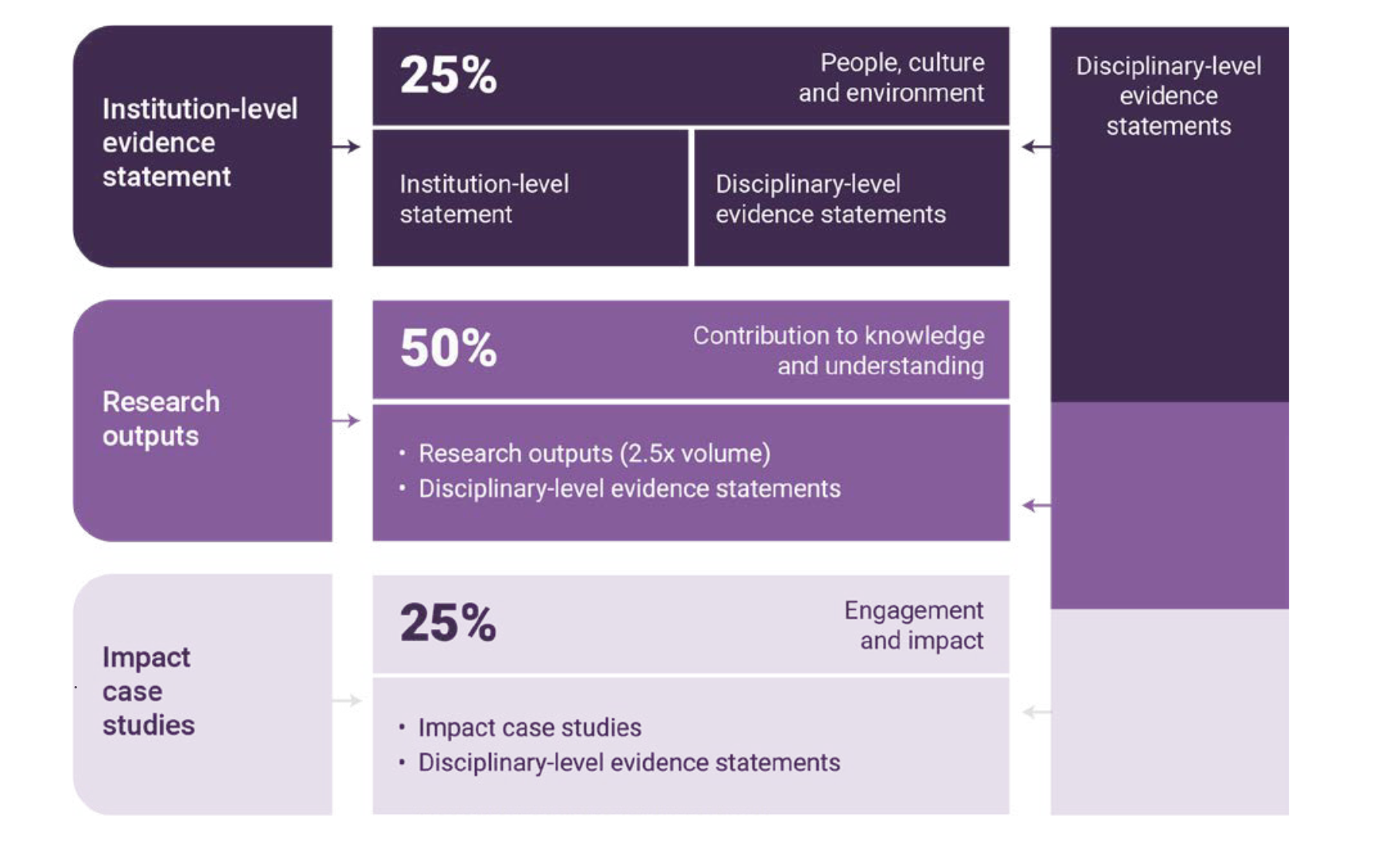Research Excellence Framework: A REF-erence for success?
The introduction of the current Research Excellence Framework (REF) system in 2014 marked the UK government’s commitment to supporting innovative research outputs from academics at Higher Education Providers (HEPs) and universities in the United Kingdom. Besides enabling researchers to produce quality research, REF is useful to demonstrate the benefits of research and to provide evidence for meaningful investments.
Now in its third round, set to be published in 2028, the UK’s higher education funding bodies will allocate funding according to a set of new criteria. In this article, I will summarise what the Research Excellence Framework is, and how the proposed changes in the 2028 version may impact research carried out by UACES’s UK-based members and their institutions.
 Image Credit: Pexels #210158
Image Credit: Pexels #210158
What impact does REF have?
Simply put, REF outcomes are graded according to a set of criteria which assesses the quality of submitted research and the impact they make in society. Depending on the grade, research institutions and universities receive a certain level of central funding for research projects in the term of 5-7 years. Therefore, it is important for universities and institutions to have a good outcome in the REF to secure a larger annual amount for their funding pot. Although the allocated REF funding is not the main funding source for most institutions, receiving a high research excellence grade may improve the institution’s reputation, help with student recruitment, and attract other research funders.
Learning from previous REFs
However, despite its clear responsibilities and established position, the REF is not without opposition. According to Mandler, an assessor on the national panel for history, it is the ‘least worst way to distribute limited government research funding across the wider range of universities’. Sivertsen, a Research Professor at the Nordic Institute for Studies for Innovation, Research and Education (NIFU), adds that using indicators (metrics) to evaluate funding decisions is limited; rather, peer review ‘should remain the primary basis for assessing national assessment exercises like the REF’. Clearly, there are some criticisms on how REF funding is allocated; however, recently announced reforms set to be introduced in the 2028 version could garner more support for the framework.
2028 REF-orms
Unlike the previous assessment criteria outlined in existing Research Excellence Frameworks (following the criteria of Outputs 60%, Impact 25%, Environment 15%), proposals for the 2028 version would assess institutions, rather than individuals, on their research performance. Contributors are set to provide their submissions in late 2027 and research excellence will be appraised according to a wider range of research activities and their positive impacts.
The new criteria to assess research excellence in the 2028 REF consists of three elements with different weightings assigned to them: people and culture (25%); contribution to knowledge and understanding (50%); and engagement and impact (25%).
This broader approach will recognise the importance of the research environment, diverse types of outputs, and the societal impact of research. This all reflects the commitment in the 2028 REF for inclusion and research diversity.

Image Credit: A schematic to illustrate the relationship between submissions and assessment (p.13 of Research Excellence Framework 2028: Initial decisions and issues for further consideration pdf)
People, Culture, and Environment
The goal for this assessment element is to evaluate outcomes in terms of the research environment using a questionnaire-style template. This will take place at both the institution level (IL) and the disciplinary level (DL) to provide a better understanding of the overall research environment, support for staff, resource use, planning, and engagement.
Contribution to Knowledge and Understanding
This part ensures that research outputs and the institution’s explanatory statement are considered when assessing the contributions to knowledge in the discipline and how this represents the research and researchers in the field. Evaluating the institution's overall contribution to knowledge and understanding, rather than just individual researchers' outputs, supporting a more comprehensive and fair assessment of research excellence.
A wide range of output types for assessment, including practice research, audio and video content, scholarly editions, software, datasets, and artefacts are also welcomed by the funding bodies.
Engagement and Impact
This element will be assessed by quantitative and qualitative evidence to show the contribution to society and the economy. This assessment will be based on the institution's statement submission at the disciplinary level (DL) and will also draw from the research environment section. The previous 2* requirement will be removed to open a wider base of research.
REF and Open Access
Beyond the assessment element reforms, a separate consultation on the REF 2028 open access policy will take place in late 2023. For research funded by the UK’s higher education funding bodies (Research England, Scottish Funding Council, Higher Education Funding Council for Wales and Department for the Economy, Northern Ireland), it is an expectation that articles are published as open access. From 2024, there is an additional requirement for researchers who receive REF funding to make book chapters, edited collections and monographs available open access, according to the UKRI’s guidelines.
Through open access, research is electronically available without licensing issues or additional charge, thereby widening engagement within the academic community and beyond. For more information, UACES recently published a resource article outlining what open access is and the potential it has.
Why does Research Excellence Matter to UACES?
Although a UK government initiative, the REF provides insight into how cutting-edge research should be encouraged across various disciplinary fields. UACES’ commitment to supporting research excellence is demonstrated by events like the annual Graduate Forum Research Conference, which supports early career members, as well as various research networks.
The inaugural workshop of the UACES REF Impact Network, led in January 2023 by Professor Roberta Guerrina, Professor Simon Usherwood, and Professor Richard Whitman brought together REF 2021 panel members and colleagues to discuss how research outputs in European Studies can be highlighted in the next REF. This event focused on the multidimensional nature of contemporary European Studies and its uniqueness among other traditional disciplines, which could allow our members and their institutions to perform well in the 2028 REF. Notably, the upcoming REF aims to recognise the value of interdisciplinary research because it is often overlooked as its 'processes and outputs do not necessarily follow traditional formats and may be perceived to score less well'.
REF-lections & Looking Forwards
As the academic community looks forward to reforms set to be introduced in time for the 2028 REF, UACES promotes research excellence and exchange for all our members. Our REF Impact network, membership events and other opportunities aim to support researchers to produce innovative outputs in the field of contemporary European Studies by offering a space that is open for exchange and discussions and give access to small grants that support research activities. Make sure you look out for activities that help prepare for the next REF.

